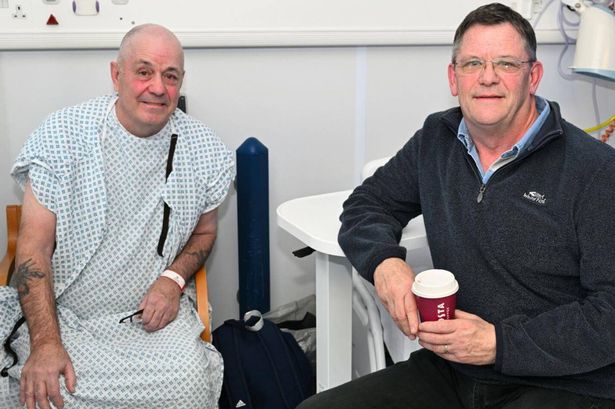The story of Alan and Keith Powell underscores the critical importance of awareness, early detection, and open communication in confronting prostate cancer, a disease that affects millions of men worldwide. Alan’s journey began unexpectedly, sparked by a seemingly trivial event. A lighthearted joke about his frequent trips to the bathroom planted a seed of doubt, prompting him to seek medical advice. This casual observation, which many might have dismissed, proved pivotal. It led to a prostate cancer diagnosis in 2020, a life-altering event that initiated a challenging but ultimately successful fight against the disease. Alan’s experience became a catalyst for his older brother, Keith. Witnessing Alan’s diagnosis and subsequent treatment journey, Keith, despite initially feeling healthy himself, was inspired to undergo prostate cancer screening. This proactive decision proved crucial as it revealed that Keith, too, harbored the disease.
The parallel experiences of the Powell brothers exemplify the often silent and insidious nature of prostate cancer. In its early stages, the disease frequently presents minimal or no symptoms, making routine screenings indispensable, particularly for men over 50 or those with a family history of the disease. While the initial shock of a cancer diagnosis can be overwhelming, Alan and Keith’s stories demonstrate the power of early intervention. Their proactive approach to testing allowed for timely diagnoses, significantly improving their prognosis and treatment options. Early detection often means the cancer is less advanced, which can lead to more effective treatment outcomes and a higher likelihood of successful remission. The brothers’ narratives highlight how a single, seemingly insignificant action, like taking a test, can be a turning point in the fight against this potentially life-threatening disease.
Beyond the medical aspects, the Powell brothers’ story illuminates the crucial role of family support and open communication in navigating the complexities of cancer. Alan’s decision to share his experience with Keith encouraged his brother to take charge of his own health, ultimately leading to a timely diagnosis. This open dialogue between the brothers not only facilitated early intervention but also fostered a vital support system during a challenging period. Sharing their experiences allowed them to offer mutual encouragement, learn from each other’s journeys, and face the challenges of treatment with shared strength and resilience. This emphasizes the critical need for families to engage in open conversations about health concerns, particularly regarding diseases like prostate cancer, which can often be a difficult topic to broach.
The Powell brothers’ experiences also serve as a valuable case study for understanding the complex interplay of genetics and lifestyle factors in prostate cancer. While the exact causes of prostate cancer remain an area of ongoing research, certain risk factors, including age, family history, and ethnicity, are known to increase susceptibility. The fact that both brothers developed the disease suggests a potential genetic predisposition within their family. This underscores the importance of genetic counseling and risk assessment for individuals with a family history of prostate cancer. Furthermore, lifestyle factors, such as diet and exercise, are also believed to play a role in prostate cancer development. Understanding these risk factors and adopting healthier lifestyle choices can contribute to reducing the risk of developing the disease or its progression.
The story of Alan and Keith Powell extends beyond their personal experiences. It serves as a potent message for broader public health initiatives aimed at raising awareness and promoting early detection of prostate cancer. By sharing their journey, they provide a relatable and compelling narrative that encourages other men to prioritize their health and seek appropriate medical advice. Their experience underlines the importance of public health campaigns that educate men about the risks, symptoms, and screening options available for prostate cancer. Such initiatives can empower men to make informed decisions about their health and overcome the often-present stigma surrounding discussions about men’s health issues. The Powell brothers’ story reminds us that early detection is often the key to successful treatment and offers hope to those facing a similar diagnosis.
Finally, the narrative of Alan and Keith’s journey serves as a testament to the power of human resilience and the importance of a positive outlook when facing adversity. Despite the emotional and physical challenges posed by their cancer diagnoses, both brothers demonstrated remarkable strength and determination throughout their treatment. Their story is a powerful reminder that a cancer diagnosis is not a death sentence. With advancements in medical technology and treatment options, coupled with early detection and a supportive environment, individuals diagnosed with prostate cancer can live long and fulfilling lives. The Powell brothers’ experience embodies hope and encourages others facing similar challenges to approach their treatment with courage and optimism. Their story is not merely about a disease; it’s about the strength of the human spirit and the importance of early intervention in the fight against cancer.














